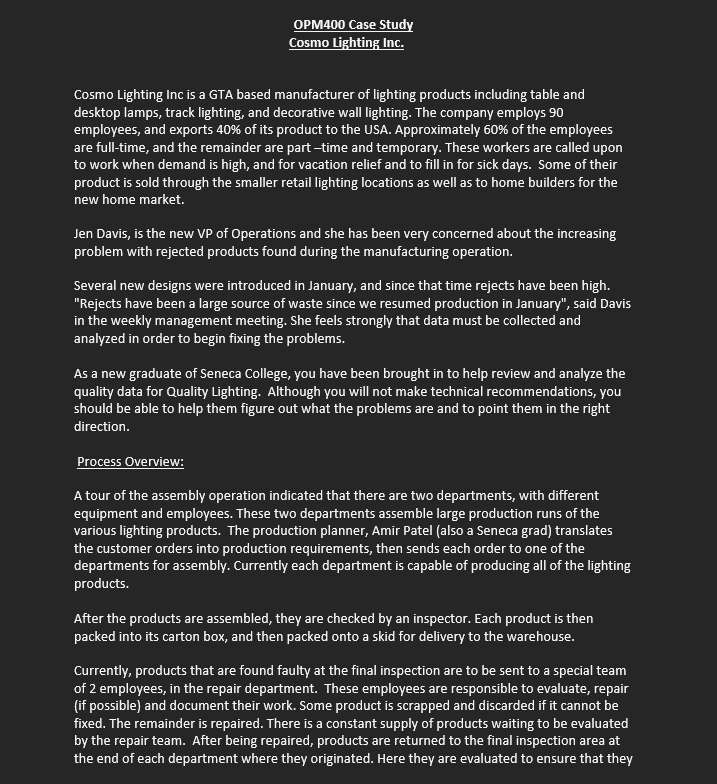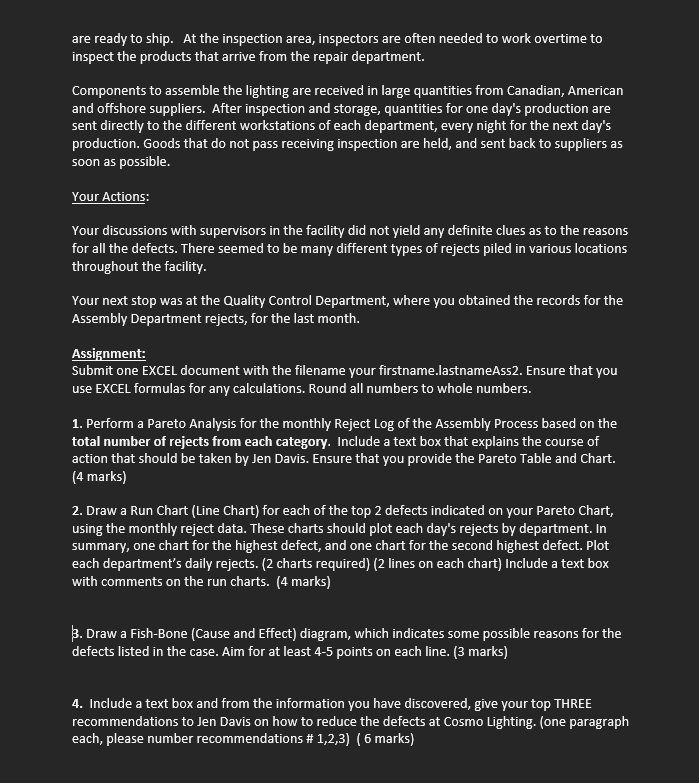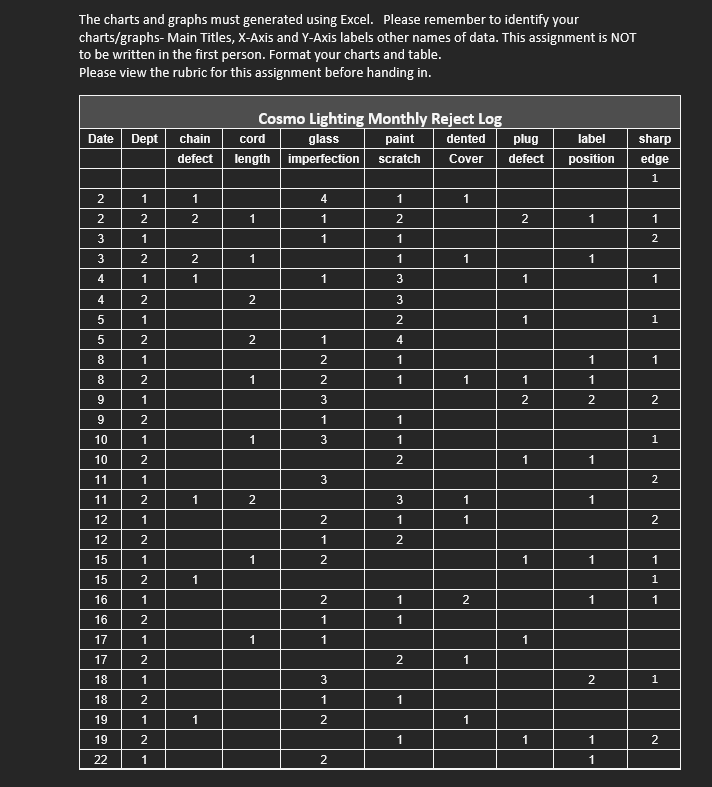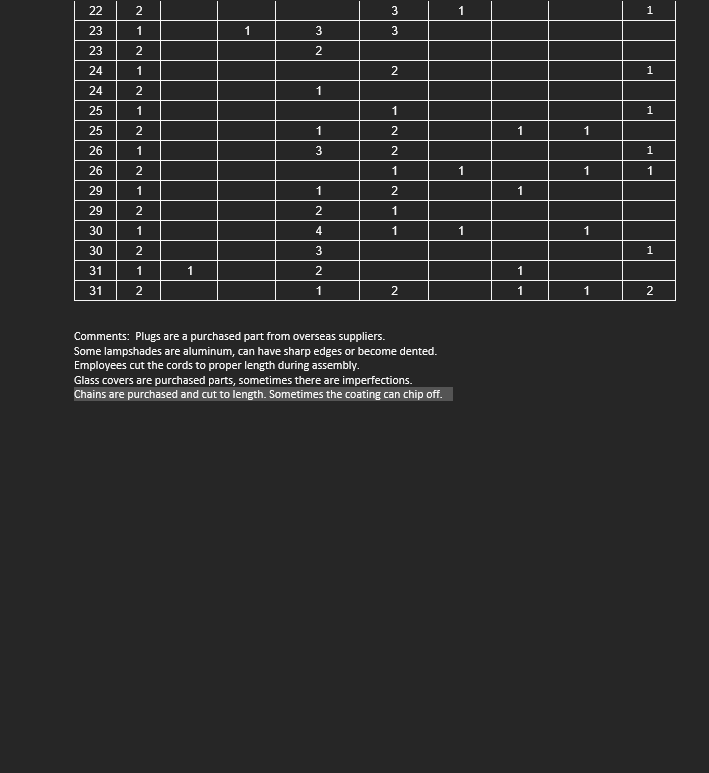



OPM400 Case Study Cosmo Lighting Inc. Cosmo Lighting Inc is a GTA based manufacturer of lighting products including table and desktop lamps, track lighting, and decorative wall lighting. The company employs 90 employees, and exports 40% of its product to the USA. Approximately 60% of the employees are full-time, and the remainder are part-time and temporary. These workers are called upon to work when demand is high, and for vacation relief and to fill in for sick days. Some of their product is sold through the smaller retail lighting locations as well as to home builders for the new home market. Jen Davis, is the new VP of Operations and she has been very concerned about the increasing problem with rejected products found during the manufacturing operation. Several new designs were introduced in January, and since that time rejects have been high. "Rejects have been a large source of waste since we resumed production in January", said Davis in the weekly management meeting. She feels strongly that data must be collected and analyzed in order to begin fixing the problems. As a new graduate of Seneca College, you have been brought in to help review and analyze the quality data for Quality Lighting. Although you will not make technical recommendations, you should be able to help them figure out what the problems are and to point them in the right direction. Process Overview: A tour of the assembly operation indicated that there are two departments, with different equipment and employees. These two departments assemble large production runs of the various lighting products. The production planner, Amir Patel (also a Seneca grad) translates the customer orders into production requirements, then sends each order to one of the departments for assembly. Currently each department is capable of producing all of the lighting products. After the products are assembled, they are checked by an inspector. Each product is then packed into its carton box, and then packed onto a skid for delivery to the warehouse. Currently, products that are found faulty at the final inspection are to be sent to a special team of 2 employees, in the repair department. These employees are responsible to evaluate, repair (if possible) and document their work. Some product is scrapped and discarded if it cannot be fixed. The remainder is repaired. There is a constant supply of products waiting to be evaluated by the repair team. After being repaired, products are returned to the final inspection area at the end of each department where they originated. Here they are evaluated to ensure that they are ready to ship. At the inspection area, inspectors are often needed to work overtime to inspect the products that arrive from the repair department. Components to assemble the lighting are received in large quantities from Canadian, American and offshore suppliers. After inspection and storage, quantities for one day's production are sent directly to the different workstations of each department, every night for the next day's production. Goods that do not pass receiving inspection are held, and sent back to suppliers as soon as possible. Your Actions: Your discussions with supervisors in the facility did not yield any definite clues as to the reasons for all the defects. There seemed to be many different types of rejects piled in various locations throughout the facility. Your next stop was at the Quality Control Department, where you obtained the records for the Assembly Department rejects, for the last month. Assignment: Submit one EXCEL document with the filename your firstname.lastnameAss2. Ensure that you use EXCEL formulas for any calculations. Round all numbers to whole numbers. 1. Perform a Pareto Analysis for the monthly Reject Log of the Assembly Process based on the total number of rejects from each category. Include a text box that explains the course of action that should be taken by Jen Davis. Ensure that you provide the Pareto Table and chart. (4 marks) 2. Draw a Run Chart (Line Chart) for each of the top 2 defects indicated on your Pareto Chart, using the monthly reject data. These charts should plot each day's rejects by department. In summary, one chart for the highest defect, and one chart for the second highest defect. Plot each department's daily rejects. (2 charts required) (2 lines on each chart) Include a text box with comments on the run charts. (4 marks) 3. Draw a Fish-Bone (Cause and Effect) diagram, which indicates some possible reasons for the defects listed in the case. Aim for at least 4-5 points on each line. (3 marks) 4. Include a text box and from the information you have discovered, give your top THREE recommendations to Jen Davis on how to reduce the defects at Cosmo Lighting. (one paragraph each, please number recommendations # 1,2,3) (6 marks) The charts and graphs must generated using Excel. Please remember to identify your charts/graphs-Main Titles, X-Axis and Y-Axis labels other names of data. This assignment is NOT to be written in the first person. Format your charts and table. Please view the rubric for this assignment before handing in. Date Dept chain Cosmo Lighting Monthly Reject Log cord glass paint dented length imperfection scratch Cover plug defect label position defect sharp edge 1 2 1 1 4 1 1 | | 2 2 2 1 1 2 2 1 1 1 1 1 2 3 3 4 2 2 1 | | | 1 1 1 1 1 1 1 1 4 2 3 2 1 5 2 1 1 5 N 1 4 2 1 8 2 1 1 1 8 1 2 1 1 1 1 2 1 9 3 2 2 2 | | | 9 1 2 1 10 1 3 1 1 10 2 2 1 1 11 1 3 N 11 2 1 2 3 1 1 12 1 2 1 1 2 2 12 2 1 2 15 1 1 2 1 1 1 15 2 1 1 16 1 2 2 1 2 1 1 16 2 1 1 17 1 1 1 1 17 2 2 1 18 1 3 2 2 1 18 2 1 1 19 1 1 2 2 1 19 1 1 1 2 2 1 22 2 1 22 2 3 1 1 | 23 1 1 3 3 | 23 2 2 24 1 2 1 24 2 1 25 1 1 1 25 2 2 1 1 | 26 1 2 1 26 2 1 1 1 1 29 1 1 2 1 29 2 2 1 30 1 4 1 1 1 30 3 1 31 2 1 2 1 1 2 1 31 2 1 1 N Comments: Plugs are a purchased part from overseas suppliers. Some lampshades are aluminum, can have sharp edges or become dented. Employees cut the cords to proper length during assembly. Glass covers are purchased parts, sometimes there are imperfections. Chains are purchased and cut to length. Sometimes the coating can chip off










